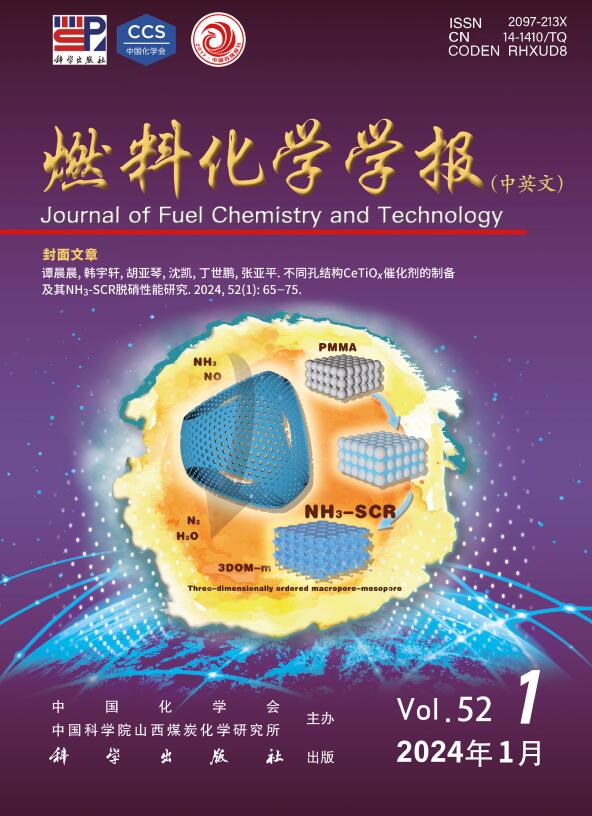固相法可控合成 CuAlO2 及其在甲醇蒸汽转化制氢过程中的催化性能
Q3 Energy
引用次数: 0
摘要
本研究探讨了以氢氧化铜和假沸石粉末为原料,通过简单的固相球磨法可控合成 CuAlO2,并研究了其在甲醇蒸汽转化(MSR)中的催化性能。在煅烧温度、煅烧气氛和加热速率等不同条件下制备了各种催化剂。采用 BET、XRD、XPS、SEM 和 H2-TPR 等表征技术对样品进行了分析。结果表明,煅烧温度对 CA-T 催化剂的相组成、比表面积、还原性能和表面特性有显著影响。根据研究结果,提出了固相法合成 CuAlO2 的路线,强调了高煅烧温度、氮气氛和低加热速率对 CuAlO2 形成的重要性。催化评估数据表明,CuAlO2 无需预还原即可催化 MSR,CA-T 催化剂的催化性能受煅烧温度的影响明显。在制备的催化剂中,CA-1100 催化剂的催化活性和稳定性最高。本研究的结果可能有助于进一步研究用于缓释催化的催化材料,包括催化材料的合成和缓释催化性能的调控。本文章由计算机程序翻译,如有差异,请以英文原文为准。
Controllable synthesis of CuAlO2 via solid-phase method and its catalytic performance for methanol steam reforming to hydrogen
This study explores the controllable synthesis of CuAlO2 using copper hydroxide and pseudo-boehmite powders as raw materials via a simple solid-phase ball milling method, along with its catalytic performance investigation in methanol steam reforming (MSR). Various catalysts were prepared under different conditions, such as calcination temperature, calcination atmosphere, and heating rate. Characterization techniques including BET, XRD, XPS, SEM and H2-TPR were employed to analyze the samples. The results revealed significant effects of calcination temperature on the phase compositions, specific surface area, reduction performance, and surface properties of the CA-T catalysts. Based on the findings, a synthesis route of CuAlO2 via the solid-phase method was proposed, highlighting the importance of high calcination temperature, nitrogen atmosphere, and low heating rate for CuAlO2 formation. Catalytic evaluation data demonstrated that CuAlO2 could catalyze MSR without pre-reduction, with the catalytic performance of CA-T catalysts being notably influenced by calcination temperature. Among the prepared catalysts, the CA-1100 catalyst exhibited the highest catalytic activity and stability. The findings of this study might be useful for the further study of the catalytic material for sustained release catalysis, including the synthesis of catalytic materials and the regulation of sustained release catalytic performance.
求助全文
通过发布文献求助,成功后即可免费获取论文全文。
去求助
来源期刊

燃料化学学报
Chemical Engineering-Chemical Engineering (all)
CiteScore
2.80
自引率
0.00%
发文量
5825
期刊介绍:
Journal of Fuel Chemistry and Technology (Ranliao Huaxue Xuebao) is a Chinese Academy of Sciences(CAS) journal started in 1956, sponsored by the Chinese Chemical Society and the Institute of Coal Chemistry, Chinese Academy of Sciences(CAS). The journal is published bimonthly by Science Press in China and widely distributed in about 20 countries. Journal of Fuel Chemistry and Technology publishes reports of both basic and applied research in the chemistry and chemical engineering of many energy sources, including that involved in the nature, processing and utilization of coal, petroleum, oil shale, natural gas, biomass and synfuels, as well as related subjects of increasing interest such as C1 chemistry, pollutions control and new catalytic materials. Types of publications include original research articles, short communications, research notes and reviews. Both domestic and international contributors are welcome. Manuscripts written in Chinese or English will be accepted. Additional English titles, abstracts and key words should be included in Chinese manuscripts. All manuscripts are subject to critical review by the editorial committee, which is composed of about 10 foreign and 50 Chinese experts in fuel science. Journal of Fuel Chemistry and Technology has been a source of primary research work in fuel chemistry as a Chinese core scientific periodical.
 求助内容:
求助内容: 应助结果提醒方式:
应助结果提醒方式:


